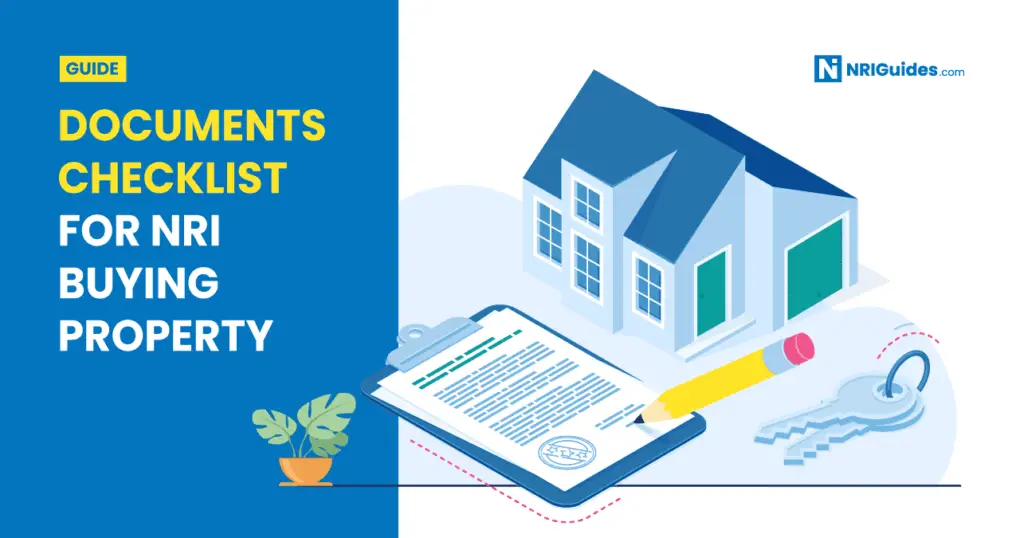The NRI Guides Team regularly reviews this article to ensure the content is up-to-date and accurate. The last editorial review and update were on 25 October 2023.
The process of purchasing a property, whether it’s your dream home or an investment opportunity, involves a series of critical documents to ensure a smooth transaction. Non-Resident Indians (NRIs) looking to buy property in India should be well-prepared with the necessary paperwork.
Below is a list of the most common documents required for NRI to buy property in India. Having these ready ahead of time will help ensure a smooth transaction.
Table of Contents
Documents Checklist for NRI Buying Property
Here are the common documents to be produced by the buyer, and seller during a property transaction:
Documents To Be Produced by The Buyer
The buyer should have these documents ready before the property registration:
1. Passport and OCI Card (if applicable)
To purchase property in India, an NRI must provide a valid passport. For individuals with an Indian passport or Overseas Citizen of India (OCI) Card, no prior approval from the Reserve Bank of India (RBI) is required to buy residential or commercial properties in India.
OCI holders need to present their OCI Cards along with their foreign passports to acquire property.
2. Proof of Address
NRIs must furnish a document verifying their address in India, which can include Aadhaar cards, Ration cards, utility bills (such as electricity or telephone bills), or other valid documents.
In cases where the NRI buyer does not have a residence in India, proof of their overseas residential address should be provided, which can be documents like a driver’s license, identity card, work permit, or utility bills, among others.
3. PAN Card
A Permanent Account Number (PAN) card is essential for NRI investors, particularly if they intend to rent out the property. Rental income is taxable, and any future capital gains from selling the property are subject to taxation.
However, in the absence of a PAN card, Form 60 can be used as an exemption.
4 Power of Attorney (if applicable)
If the purchase transaction is prolonged or the NRI buyer is not present in India, they can appoint a legal representative through a Power of Attorney (PoA) to execute the transaction on their behalf.
A special PoA, which is registered and notarized, is required for property transactions. If the PoA is prepared abroad, it must be processed through the Indian Embassy or Consulate.
5. Loan Sanction Letter (if applicable)
NRIs are eligible for home loans to finance their property purchase, similar to resident Indians. The loan sanction letter serves as proof that the applicant is eligible to secure a specific loan amount, subject to the lender’s terms and conditions.
The seller can request this letter to ensure that the buyer can complete the property purchase within the stipulated period.
6. Passport-size photographs
A few passport-size photographs of the buyer are needed during the property registration process.

Documents To Be Produced by The Seller
The seller should provide these documents to the buyer during the transaction:
1. Title Deed with Chain of Titles
In the case of pre-owned properties, the seller must provide the current title deed in their name, which establishes their ownership of the property.
If there have been multiple previous owners, the seller should also be able to present older title deeds and the chain of title for the last 15 years, along with a history of the property’s transfer of title.
2. Land Records
In the case of apartments or buildings, a land title deed may be required in addition to the property title deed.
A land title deed, which states which land belongs to whom, is the document that defines land ownership. Having a clear land title protects the rights of the title-holder against other claims made by anyone else to the property. It is also a good idea to get a surveyor sketch in case of a plot.
There may also be additional documents needed in some cases. For instance, if the property was a government-owned land in the past, there would be restrictions on transferring them to another person. You have to check the type and history of the land through your local governing body.
Please note that some states may have specific paperwork that you need to be aware of. If in doubt, always take legal advice from a qualified professional.
3. Mutation Extracts
These records document any changes or transfers of ownership and include details such as the type of ownership, the number of homeowners and their respective shares, property financing, tenants (if any), cultivated and non-cultivated areas, and irrigation sources.
4. Updated Encumbrance Certificate
An encumbrance certificate is required to prove that the property does not have any pending legal dues or mortgages.
If the previous owner has taken any debt on the property or any loan that is pending then you can easily check it on the Encumbrance Certificate. This is one of the key documents banks ask for before they grant a loan to the buyer. It is advisable to get an Encumbrance Certificate for the past 15 years.
This certificate also has all the details related to the transactions that happened over a period of time. In India, Form 15 is issued if a property has any encumbrance registered; otherwise, Form 16 will be given to the owner, stating there are no encumbrances.
A non-Encumbrance certificate is a certificate that shows there was no previous mortgage, home loan or debt on the property.
5. Latest Property Tax Receipts
Ensuring that all property taxes and building taxes have been paid, and that there are no pending dues, is essential. Property tax receipts also help verify the property’s legal status.
6. Proof of Seller’s Address
Indian resident sellers must provide proof of their address in India, while NRI sellers need to furnish proof of both their Indian and overseas addresses, such as an Aadhaar card, passport, or utility bills.
7. Copy of Seller’s PAN Card
In the case of individual sellers, a copy of the seller’s PAN Card may be required if there is TDS (Tax Deducted at Source) to be paid on the transaction, particularly for transactions exceeding Rs. 50 lakhs.
Documents Required For Buying A Flat
In the case of flats, apartments, or buildings, the following additional documents are also required:
1. Building Permit and Building Plan
To ensure that the construction of the property has been done in accordance with set rules and regulations, the buyer must obtain copies of the building permit and building plan that have been approved by the statutory body.
2. Allotment Letter
An allotment letter is issued by a property developer or a housing authority. It states the property description and the sum paid by the buyer to the developer, thereby verifying an individual’s ownership of the property.
3. Possession Letter
This document is provided by the developer to the first buyer and sets a date on which the latter would grant the former the possession of the property.
In the case of a resale property, this document should be produced before the new buyer. Also, the bank or any other lending institution requires a copy of the possession letter of the existing owner to be able to process the application for a home loan.
4. Completion Certificate
Upon completion of construction, it is mandatory for the developer or the owner of a stand-alone property to get a completion certificate from the local authority. This certificate is awarded only if the authorities inspect and are satisfied that the project/building has been constructed according to the approved building plan and mandatory standards have been maintained.
This certificate is crucial to ensure the supply of basic amenities such as water, electricity and drainage system. The builder cannot give possession to the buyer unless the completion certificate is obtained.
5. Occupancy Certificate
An Occupancy Certificate is issued at the end of the construction by a local government agency or planning authority. It indicates that the property is in a suitable condition for occupancy.
The developer is responsible for obtaining an Occupancy Certificate and it is issued only once the building has been completed in all respects and is ready to be occupied. Any subsequent resale of the property would also have a copy of the Occupancy Certificate as part of the list of documents required to be produced by the seller.
6. No Objection Certificates (NOC)
During the construction of a housing project, a developer may have to obtain several NOCs from various authorities. Individuals purchasing directly from the developer (direct sale) or the present owner (secondary sale) should obtain copies of the NOCs and keep them on file.
7. Notice of Commencement (if applicable)
In some places, a Notice of Commencement from the corporation, municipality or panchayat, may be required if you are purchasing a house or apartment.
8. Conveyance Deed (if applicable)
Conveyance refers to the transfer of the title for land and building by the landowner in favour of the housing society by execution of the Conveyance Deed. Through Conveyance Deed, it is possible for the housing society to get a legal title in its name.
In the absence of conveyance:
- An individual who has purchased a flat in the building, will not have ownership of the land where the building is constructed.
- If there is any damage to the building, it cannot be reconstructed without the permission of the landowner.
- The landowner may mortgage the property since he/she is the legal owner.
- The landowner may make a profit from the sale of open spaces, gardens, terraces, parking spaces, etc. within the society.
9. NOC from the Housing Society (if applicable)
For an apartment in a particular housing society, a letter from the society is needed for the sales process. This document states the seller is a member of the society and has no outstanding payments.
10. Share Certificate from the Housing Society (if applicable)
Some housing societies also issue share certificates to individual owners. You need to check with your society if this is applicable.
11. RERA Registration Certificate (if applicable)
RERA Certificate is issued by the Real Estate Regulatory Authority (RERA) of a State to the builders who register their projects with the state RERA. As per the RERA Act, a builder cannot promote his project or market it for sale without getting a RERA Certificate from the authority.
Sale Deed to be prepared for the transaction
The Sale Deed is the most critical document for property transactions in India. It establishes ownership and must be registered at the office of the Sub-Registrar in the property’s location.
The property-buying process can seem complex, but with this comprehensive documents checklist, you can navigate it successfully. Following this checklist will help ensure a smooth property purchase. Good luck with your home-buying journey!
Frequently Asked Questions
Can NRI buy property in India without Power of Attorney?
If the NRI is not present in India, they must provide a Power of Attorney. To execute a property transaction, you will need a special Power of Attorney that is registered and notarized and not a general Power of Attorney.
Can NRI buy property in India without Aadhar card?
Yes, an Aadhar card is not compulsory for an NRI/OCI to buy property in India.
Does NRI need a TAN number for buying a property?
TAN number is not required if the property is purchased from a Resident Indian. TAN is needed in case the property is purchased from a Non-Resident Indian.
You May Also Like
- NRI Buying Property in India: All Your Questions Answered
- NRI Home Loan: Eligibility, Interest Rates and More
- NRI Selling Property in India: The Ultimate Guide
- Foreigners Buying Property in India: Things To Know
Copyright © NRIGuides.com – Unauthorized reproduction of this article in any language is prohibited. The information provided on this website is intended for general guidance and informational purposes only. It should not be considered a substitute for professional advice.

Aneesh, the Founder & Editor of DG Pixels, holds a Master’s Degree in Communication & Journalism, and has two decades of experience living in the Middle East. Since 2014, he and his team have been sharing helpful content on travel, visa rules, and expatriate affairs.

Nice Article
How it can be downloaded for future reference